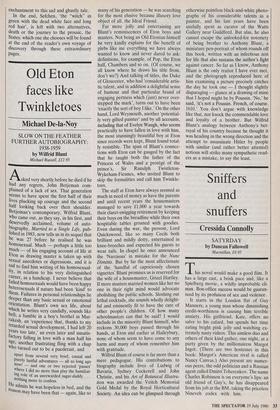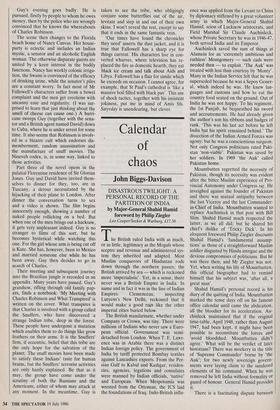Sniffers and snuffers
Cressida Connolly
SATYRDAY by Duncan Fallowell
Macmillan, f9.95
This novel would make a good film. It has a large cast, a brisk pace and, like a Spielberg movie, a wildly improbable cli- max. Box-office success would be guaran- teed by its profusion of sex and violence.
It starts in the London flat of Guy Manners, a young man whose diminishing credit-worthiness is causing him terrible anxiety. His girlfriend, Kate, offers no salve to his cafard, but spends her time eating bright pink jelly and watching ex- tremely nasty videos. This aimless duo and others of their kind gather, one night, at a party given by the millionairess Margot Ingot. (There are two hostesses in this book: Margot's American rival is called Nancy Canvas.) Also present are numer- ous peers, the odd politician and a Russian agent called Dmitri Tcherenkov. The name Charles Robinson is on everyone's lips: an old friend of Guy's, he has disappeared from his job at the BM, taking the priceless Nineveh codex with him. Guy's evening goes badly. He is pursued, firstly by people to whom he owes money, then by the police who are wrongly convinced that he knows the whereabouts of Charles Robinson.
The scene then changes to the Florida beach home of Nancy Canvas. Her house- party is eclectic and includes an Indian mystic, a senator and an alcoholic English woman. The otherwise disparate guests are united by a keen interest in the bodily functions. Nancy has weekly colonic irriga- tion, the Swami is convinced of the efficacy of drinking urine, while the senator's piles are a constant worry. In fact most of Mr Fallowell's characters suffer from a bowel complaint and the men get erections with uncanny ease and regularity. (I was sur- prised to learn that just thinking about the smell of cheese can cause one.) A hurri- cane sweeps Guy (together with the sena- tor and a British agent named David) down to Cuba, where he is under arrest for some time. It also seems that Robinson is involv- ed in a bizarre cult which endorses dis- memberment, random assassination and the manufacture of snuff movies. The Nineveh codex, is, in some way, linked to those activities.
Part three of the novel opens in the palatial Florentine residence of Sir Glorian Jones. Guy and David have invited them- selves to dinner for they, too, are in Tuscany, a detour necessitated by the hijacking of their plane to London. After dinner the conversation turns to sex and a video is shown. The film begins innocently enough, showing a number of naked people rollicking on a bed. But when one of the men brings out a hacksaw, it gets very unpleasant indeed. Guy is no stranger to films of this sort, but he becomes hysterical while watching this one. For the girl whose arm is being cut off is Kate. She has, however, been to Mexico and married someone else while he has been away. Guy then •decides to go in search of Charles.
Their meeting and subsequent journey into the Brazilian jungle is recorded in an appendix. Many years have passed. Guy's grandson, rifling through old family pap- ers, finds a notebook: 'My Meeting with Charles Robinson and What Transpired' is written on the cover. What transpires is that Charles is involved with a group called the Snuffers, who have discovered a strange Indian tribe, deep in the forest. These people have undergone a mutation which enables them to do things like grow feathers on their arms. It is the Snuffers' firm, if eccentric, belief that this tribe are the only hope for the salvation of the planet. The snuff movies have been made to satisfy these Indians' taste for human brains, but the Snuffers' terrorist activities are only hazily explained. Be that as it may, the group have come under the scrutiny of both the Russians and the Americans, either of whom may attack at any moment. In the meantime, Guy is taken to see the tribe, who obligingly conjure some butterflies out of the air, levitate and step in and out of their own skins. I won't reveal the rest, except to say that it ends in the same fantastic vein.
`Our times have found the chronicler they need' asserts the dust jacket, and it is true that Fallowell has a sharp eye for things current. His characters live in con- verted wharves, where television has re- placed the fire as domestic hearth; they eat black ice cream and talk about Aids and Libya. Fallowell has a flair for simile which he exceeds on occasion. I cannot agree, for example, that St Paul's cathedral is 'like a massive boil filled with black pus'. This use of shock tactics, together with his insistent jokiness, put me in mind of Amis fils. Satyrday is unendearing, but clever.



















































 Previous page
Previous page